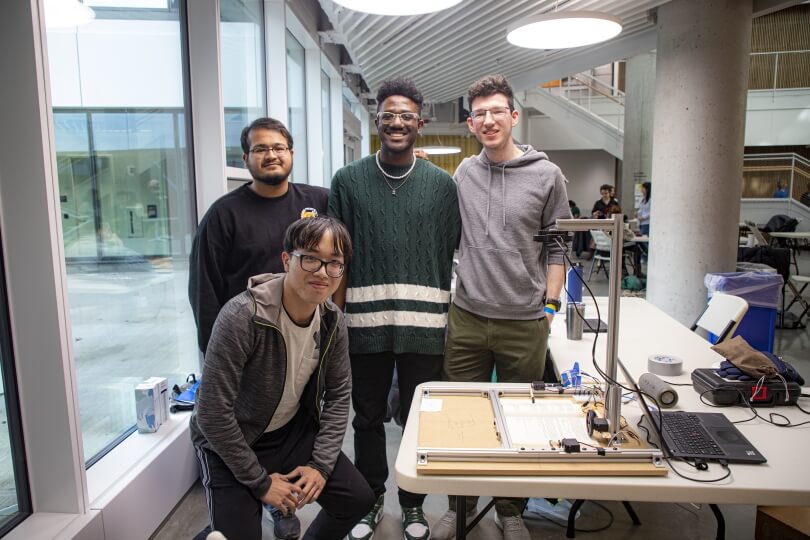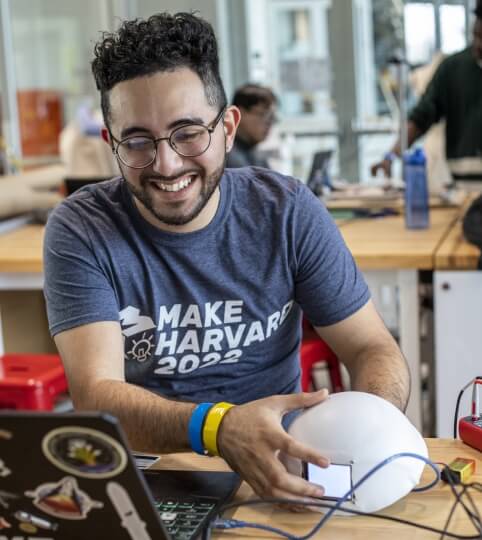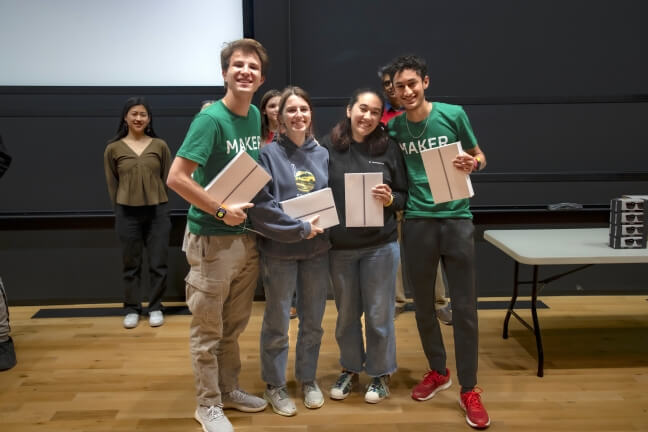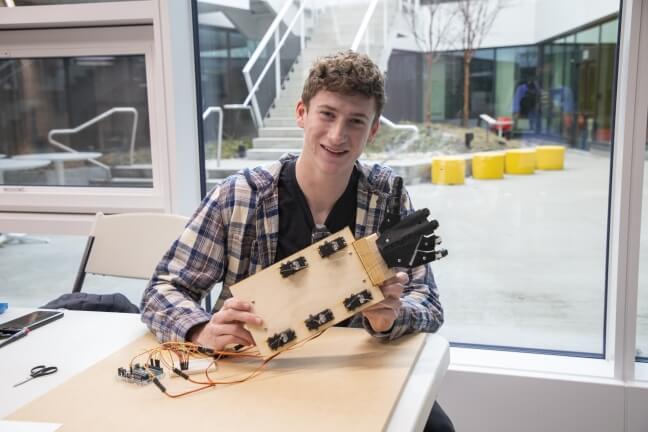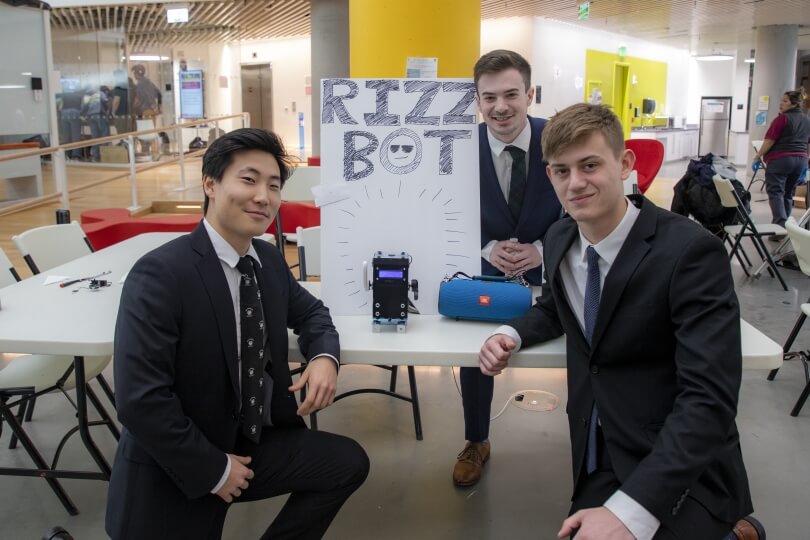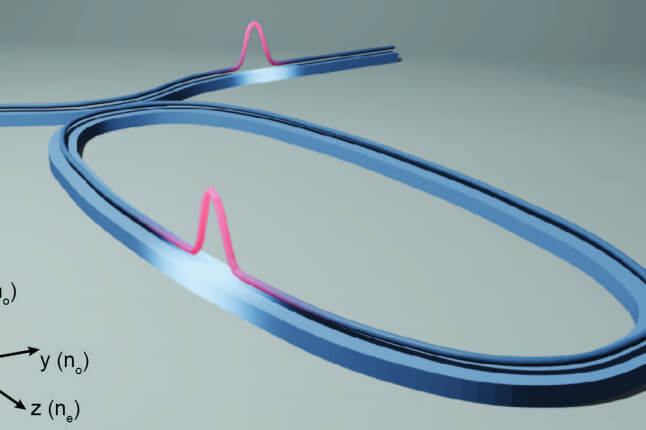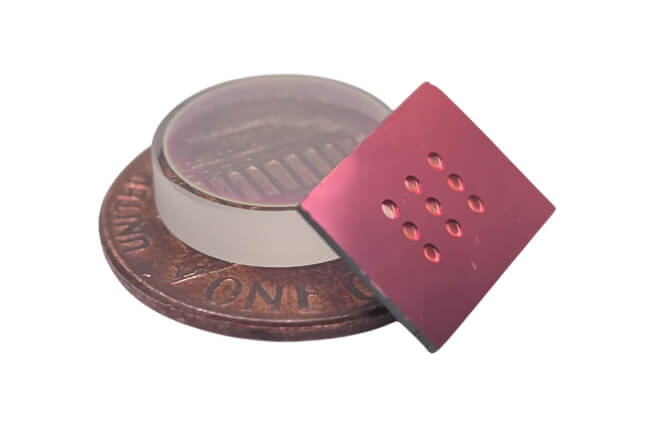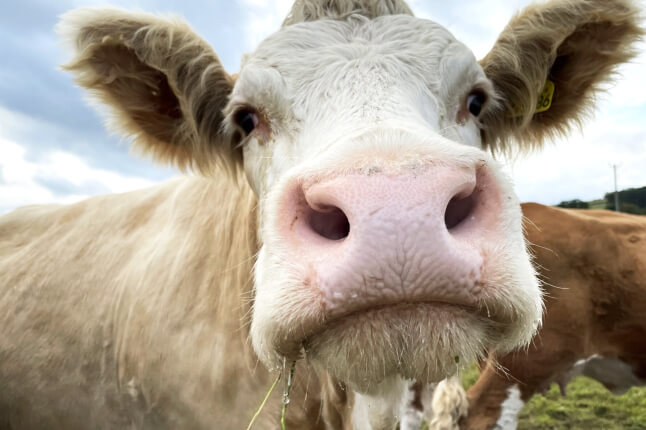News
Ryan Tran, Jeet Patel, Zabari Ross and Ben Newcomb with their “Paper Preserve Pro," which won Best Overall at MakeHarvard 2023. (Robert Anderson Photography)
When Zabari Ross attended his last MakeHarvard live event three years ago, it was his first time experiencing a makeathon, in which he had just 24 hours to design, construct and present a finished engineering project.
“I remember really enjoying being able to put my engineering skills to use, said Ross, now a senior mechanical engineering major at Brown University. “A lot of times in class we just learn the theory, and you don’t get to do hands-on work.”
Ross was one of four students whose project took home Best Overall honors at MakeHarvard 2023, which recently took place at the Harvard John A. Paulson School of Engineering and Applied Sciences (SEAS). His team, which also included Brown classmates Ben Newcomb and Jeet Patel and Northeastern freshman Ryan Tran, constructed “Paper Preserve Pro,” a combination camera, software package and automatic page-turning device that can photograph pages of a book and convert the images into text .pdf files and text-to-speech .mp3s.
“We spent a lot of time fiddling with this thing,” said Newcomb, a chemical engineering major. “Our first complete, perfect cycle was when we were being judged for the first time, so we had to keep our composure.”
MakeHarvard began in 2018 and ran for three straight years prior to the COVID-19 pandemic. The event switched to a virtual format in 2021 and was going to return as a live event last year, but new waves of the pandemic forced its cancellation.
David Andrade, a fourth-year mechanical engineering concentrator at SEAS, works on his project at MakeHarvard 2023. (Robert Anderson Photography)
To bring it back this year, organizer and fourth-year Harvard chemistry concentrator Stephon Fagan-Avery had to learn the layout of an entirely new setting, the Science and Engineering Complex (SEC).
“We have different rules, we have different protocols, and getting through all of that took a large amount of time and effort,” Fagan-Avery said. “It’s a great facility. It gives people a lot of space to work, and it allows them to spread out.”
Between a three-year absence and frigid subzero temperatures the weekend of the event, turnout for MakeHarvard 2023 was smaller than previous years. The event had averaged about 150 participants, selected from 500-600 total applicants, but this year the initial applicant pool was cut in half. In the end, the SEC hosted approximately 50 makers.
“We had such a fun time a few years ago, and I really wanted to come back and go through these same sets of skills,” said Olivia Jo Bradley, a senior robotics major from Olin College of Engineering in Needham. “Not just three years of technical knowledge, but how to carry myself, how to work on a team, how I understand myself when I’m tired.”
Bradley was one of four Olin students, along with Nabih Estefan, Charlotte Bradley and Amit Kumar, whose project “Dispraille” took home the MakeHarvard Original award. Their machine reads images and graphics on a computer screen, then converts text into Braille letters that pop up on a finger-sized display.
“It’s very rare that you get to have so much time to commit to a project that’s not going to be graded and is just a way to have fun with your friends,” said Estefan, a senior electrical and computer engineering major. “For these 24 hours, the only things you’re going to do are work, drink caffeine and maybe sleep a little.”
"Dispraille" team Nabih Estefan, Charlotte Bradley, Olivia Jo Bradley and Amit Kumar, all Olin College students, won the MakeHarvard Original award. (Robert Anderson Photography)
SEAS student Connor Carriger (mechanical engineering) with his articulated robot hand. (Robert Anderson Photography)
Making something in 24 hours can tap into skills engineering students might not often utilize in course projects whose deadlines are often days, weeks or even a full semester away. Coming up with a clear design right at the beginning becomes critical when you don’t have time to iterate.
“If you’re working for a client or doing a design project for an upper-level course, the most important thing is getting it to do the thing it’s supposed to do,” said Connor Carriger, a sophomore mechanical engineering student at SEAS who designed an articulated robotic hand. “You have to really nail down the things it has to do to work, and the secondary stuff has to be secondary.”
Teammates also have to trust each other to accomplish their assigned tasks, because there won’t be a lot of time to check each other’s work. Energy can’t be wasted on tasks that might’ve already been done elsewhere.
SEAS students Steven Cho (electrical engineering), Blake Woodford (mechanical engineering) and Terry Emeigh (applied math) won both the Sponsored Prize and Most Likely to be a Unicorn award for the “Rizzbot." (Robert Anderson Photography)
“Don’t write an algorithm from scratch if someone else has already done it,” said Chris Allum, an Olin College student whose team built an SEC breakout room into “Reflex,” in which a camera tracks a user’s movement, then tells a small robot to move to a corresponding spot. “There’s no pride in having done everything yourself. You can use that time to do something that you’re really good at, and only you can do.”
“Reflex” took home runner-up honors for Best Overall. Harvard students Terry Emeigh (applied math), Steven Cho (electrical engineering), and Blake Woodford (mechanical engineering) won both the Sponsored Prize and Most Likely to be a Unicorn award for the “Rizzbot,” which generates sentences based on data scraped from social media profiles. A 3D-printed splint by Princeton students David Bershadsky (electrical engineering) and Deniz Erdag (physics) won the Most Sustainable Prize.
MakeHarvard 2023, which was supported by undergraduate student experiences funding earmarked for SEAS-affiliated student organizations via the Teaching and Learning group, was not only the first live makeathon in three years, but also a proof of concept that the SEC can be its home for coming years. Fagan-Avery will graduate this year, but younger students on the MakeHarvard administrative team are now set up to make it even bigger in the future.
“I get to help people come together, imagine together, become friends, become better and make what they want to make,” Fagan-Avery said. “Once it got going, it started going really well. People started interacting and mingling and seemed really excited to be at the event and making in person.”
Topics: Active Learning Labs, Allston Campus, Materials Science & Mechanical Engineering, Student Organizations
Cutting-edge science delivered direct to your inbox.
Join the Harvard SEAS mailing list.
Press Contact
Matt Goisman | mgoisman@g.harvard.edu
